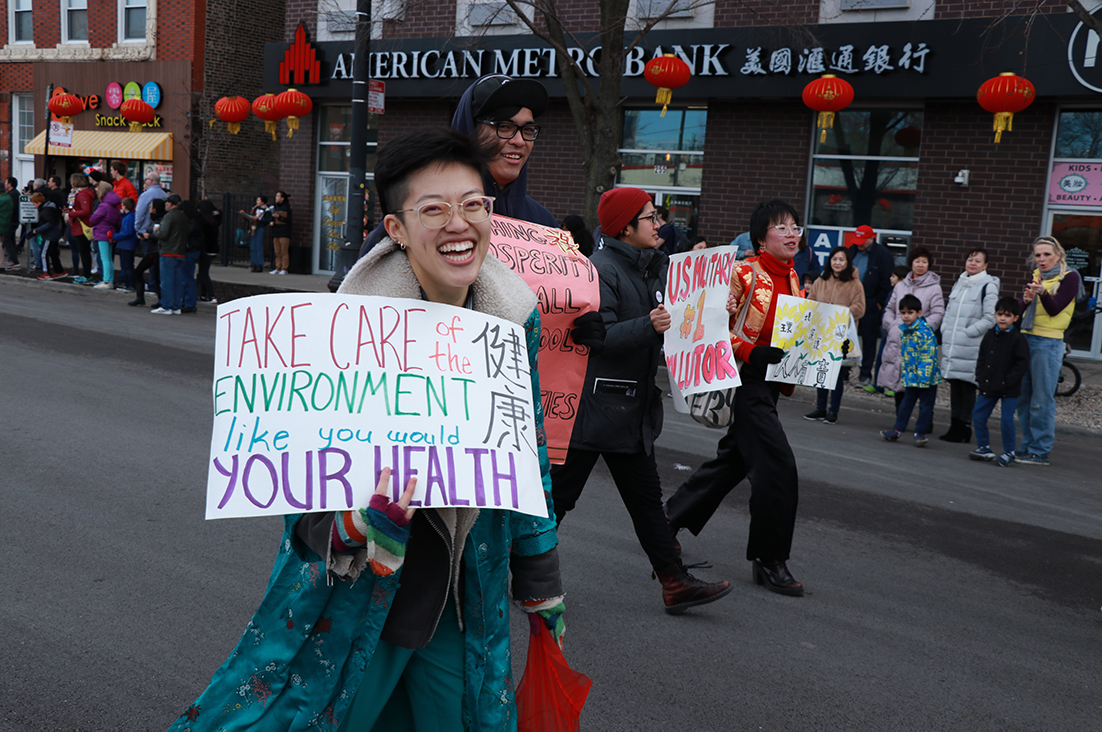By Rikki Li
Medill Reports
When Phyllis Liu was asked to share two personal facts during an icebreaker, the 27-year-old activist said: “Hi, I’m Phyllis. I use they/them pronouns, and I love Taiwanese pineapple buns.”
Sifting through handmade parade posters covered in magenta rhinestones and flecks of old paint, Phyllis Liu peeled off another strip of tape residue and recalled how La Roux singer Elly Jackson’s 2009 “Bulletproof” music video sparked their interest in nonbinary gender identity — that is, when a person identifies as neither male nor female.
“I thought they were so androgynous-looking and so aesthetically pleasing,” Liu said. “It was aspirational. I was like, ‘Woah, this is a kind of person that can exist, and I can exist like that too.’”
Liu exuded similar energy at the Chicago Chinatown Lunar New Year parade in February, though with a personal spin. Instead of a geometric power suit, they wore a teal Chinese qipao jacket and rainbow fingerless gloves. Instead of a dark jaw-sharpening contour, they had dimples and a natural flush. Instead of strutting alone toward a camera, they marched with fellow members of Invisible 2 Invincible, also known as i2i, a Chicago community organization for LGBTQ Asian Americans.
“They have a very exuberant energy,” said Annie Wu, a close friend who also attended the parade. Indeed, Liu spent the day flitting between several roles, taking photos, leading chants and corralling the group as they marched down Wentworth Avenue. “They can alternate between very playful and very serious.”
Today, despite stay-at-home orders limiting the organization’s usual potlucks and workshops, Liu continues to coordinate through i2i’s social media to provide resources for the queer Asian American community, such as posting COVID-19 infographics and invites to group support calls. Activists like Liu help to build safe, inclusive spaces for those fighting marginalization, an initiative needed more than ever as the pandemic continues to fuel anti-Asian xenophobia.
“There is the model minority myth that Asians are successful and don’t need help at all,” Liu said. “But we can see that there are huge groups of different Asian populations that are in need, left behind and forgotten.”
But Liu wasn’t always politically active. Between growing up in a largely white Illinois suburb and majoring in theater at The University of Maryland, Liu didn’t explore or consider activism until a senior year art class collaboration with a community youth group triggered a wake-up call.
“It was like I was asleep,” Liu said. “I realized what I wanted [from theater] was not a stage show with audience and stage separation. I wanted to use theater as a medium to build relationships and change people’s lives.”
Liu’s radicalization led to a deeper appreciation of their Taiwanese heritage in light of a lifetime of microaggressions. Even back in elementary school, Liu remembers being laughed at when they brought a pork floss sandwich for lunch — a Chinese snack where the meat is dried and shredded until it is airy and fluffy like cotton candy.
“It’s the best sandwich ever, but everyone was like, ‘Ew, Phyllis is eating horsehair,’” Liu said. “I brought it home and ate it, but I was angry at myself and at my mom. It was misplaced anger.”
Liu’s exploration of identity also led to a deeper appreciation for their parents’ struggles and sacrifices as immigrants. Though they feel no rush or need to officially come out as nonbinary to them, Liu recalls a family hiking trip in the Rocky Mountains where they shared a vulnerable moment with their father about relationships.
“I didn’t really have the vocabulary in Chinese [for nonbinary], but I just described it,” Liu said. “And then my dad also started opening up to me about his relationship with my mom. I remember wanting to stay very present, because something like this wasn’t going to happen again anytime soon.”
Liu encouraged others to navigate their queer or cultural journeys at their own pace. Someday, they hope to put on a solo show to tell their story, with a dance in a sweeping robe made from fabrics of the people and places that were important in their life.
“It’ll be a show designed, created, written and performed by me,” Liu said. “That’s the vision, and I guess nothing is stopping me except me.”

